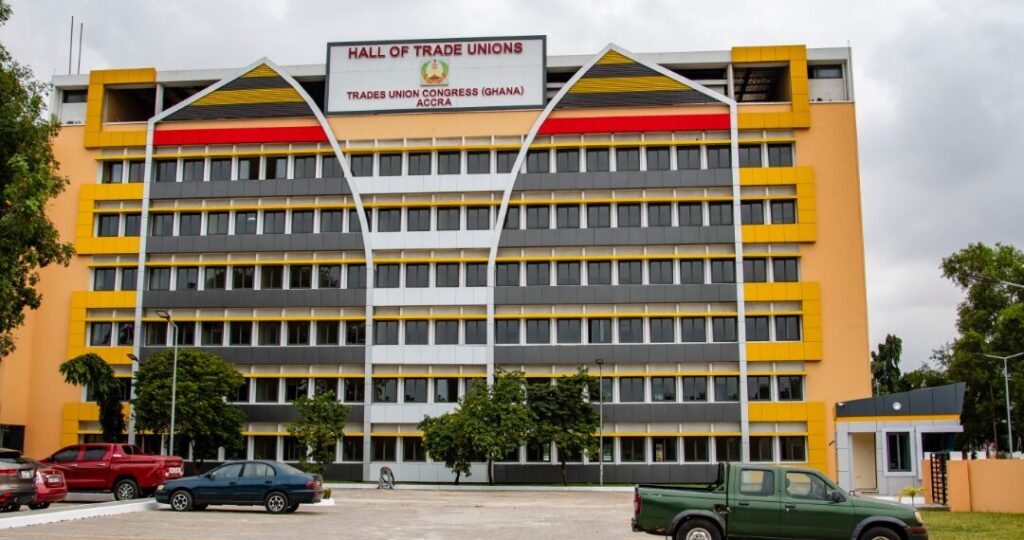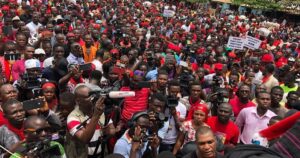
“Honest service to the nation is the answer, not any type of wanton destruction that makes the masses poorer”
IMANI’s Franklin Cudjoe in his recent write-up “Ghana’s Path Forward: Emulating Kenya’s Decisive Actions” stated among others that, “Recently, the majority leader in Parliament, Hon. Alexander Hon. Alexander Kwamena Afenyo-Markin cautioned both politicians and the citizenry when he said ‘Throughout history, frustrations and disillusionment among the masses, including the youth, have led to significant social and political unrest. The recent Gen Z activism in Kenya serves as a stark warning’”.
He continued, “To prevent such scenarios in Ghana, it is imperative that the political class collaboratively take proactive and comprehensive measures to address the underlying causes of public discontent. Our preoccupation with political manoeuvring should not blind us to the reality of public expectations”.
He tasked the citizens to, “do introspection and list all the bad behaviour you put up at work, against your fellow employees and employer- the theft, the collusion to destroy, the backbiting, the slander, the neglect and mistreatment of public works and funds, and the many ones only you know in your heart are nation-wrecking. Commit to doing them no more, and may your God or whatever gives you inspiration and reverence guide you”.
Franklin Cudjoe while forcefully putting every failure in the country on the political elites, could only appeal to the conscience of the people to change to make the country prosperous and worthy to live in.
The Kenya Experience
People tend to forget that the result of their beloved Kenya-type “anarchy, violence and plunder” was: “lives were lost, property worth billions of shillings destroyed or looted, and an attempt was made to burn down Parliament buildings.”
According to a report by the Kenya National Commission on Human Rights (KNCHR), at least 39 people were killed in the protests.
President William Ruto told journalists at a briefing on June 30 that public and private assets worth over US $18.6 million (2.4 billion Kenyan shillings) were destroyed. “The office of the Chief Justice has been burned, the City Hall has been burned, and the parliament has been burned. This is the situation,” he said.
Raila Odinga, leader of the opposition coalition Azimio la Umoja, also believed criminals hijacked the peaceful protests. He condemned the vandalism. “Scenes of people looting, vandalizing, and pillaging are way different from what was witnessed at the start of the protests when Gen Z was in complete control,” he said.
The “orgy of violence”, as the demonstration was described by the Interior Minister Kithure Kindiki, had a serious effect not only on government buildings but on civil businesses.
Fashion designer Rachel Anekea in a chat with the media recounted how her shop at Sunbeam Mall in Nairobi was destroyed by the arsonists during anti-tax protests on June 25, 2024. Her sewing machines and clients’ orders were lost, and many livelihoods were affected.
Rachel recounted a distressing incident where a group of people forcefully entered a mall that had been closed as a precaution. They poured petrol throughout the building and set it on fire, causing substantial material losses for many businesses and individuals.
Media reports say about 600 families who depended on the businesses in the mall are now left without income. The emotional toll of the deaths and the destruction is immense for Rachel and others who were connected to the Sunbeam Mall.
Events during the anti-government demonstrations have left many people worried about their financial stability and future prospects, including cab driver David Murage, who recently took a bank loan to invest in his taxi business anticipating a peak period of foreign tourist inflow. However, the ongoing protests have led to cancellations from tourists who are fearful after witnessing the unrest.
Lessons To Ghanaians
Impinging on Ghana’s developmental efforts is the citizens’ attitude to work. The work ethic of many Ghanaian workers, particularly in the public sector, is concerning and detrimental to the country’s progress. They need to change their attitude and contribute positively for the benefit of the nation. Ghanaians must realise that they have to work honestly hard for the economic growth, development, and prosperity of the country.
The working population in every country around the world plays a crucial role in driving economic growth and development. Their active participation is essential for achieving the development goals set by governments. Without the hard work and dedication of the working masses, a country’s progress and prosperity will be sluggish.

Ghanaian workers cannot expect progress and development for Ghana when they show lackadaisical attitudes toward their work, whether in the public sector or the private sector. Sad to say, a visit to any of the country’s Ministries will show the visitor how ‘hard-working’ workers there are – lateness, irregularity, lack of commitment, leaving work early, spending excessive time outside of work premises, and constantly engaging in idle gossip.
The negative attitude towards work by many Ghanaian workers contributes to low productivity and the slow pace of Ghana’s economic growth. Despite government efforts to address this issue, many workers have not changed their attitudes for the benefit of the country’s development
A Dutch-Ghanaian gentleman married to a Ghanaian lady has this to say about having a business entity in Ghana.
“My frustration comes from workers, employees or however you will call them and people who are providing services like; mechanics, plumbers, carpenters, masons, and security guards, shop attendants, petrol station attendants and many others.
“I always hear captains of industry, employers and owners of companies complaining about high levels of taxes, lack of electricity, too expensive electricity, bad roads to their companies, bureaucracy, corruption and everything else; but they are always carefully avoiding one subject: the quality of our workforce”, he said.
“In general (but there are exceptions) the Ghanaian worker doesn’t care about the quality of his job and does not have any feeling for his profession nor his customer/client. Sometimes they show a total apathy to work and just aim to drag themselves to the end of the week, simply because they need an income”, the Dutch-Ghanaian said.
According to him, in Europe there is a saying for people with low ambition: “His only planning is to go to work and come home tired”, but “in Ghana, I mostly have the feeling that coming home tired is not part of the workers plan. It made it almost impossible to employ an honest hardworking, motivated person in Ghana!”
Ghana is currently considered a rapidly developing nation, and it is important to recognize the pivotal role of its working population in driving the country’s development agenda.
It is important to regularly review and enhance employee working conditions to support the economy. The government should respond positively to worker grievances with generosity to boost morale and productivity.
The Ghana Trade Union Congress (T.U.C) should raise awareness among Ghanaian workers to be proactive and support the country’s development goals by working hard and making sacrifices.
Hard, dedicated, and honest service to the nation is the answer, not any type of wanton destruction that makes the masses poorer than before as the Kenyan incidents show. Ghana’s way forward involves changing work ethics instead of imitating Kenya.
Story: Oppong Baah






